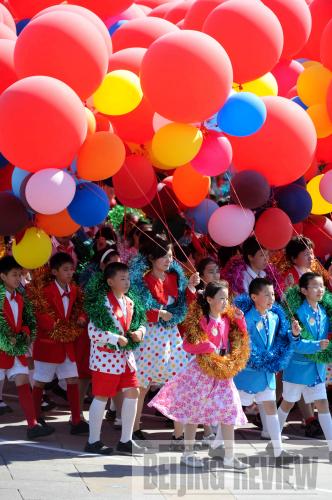|
 |
|
LOOKING INTO THE FUTURE: Children with colored balloons and wreaths in hand walk by the Tiananmen Rostrum in a parade on October 1 (LUO XIAOGUANG) |
Following the armed forces review, Hu delivered a speech on the Tiananmen Rostrum, the same place where former Chairman Mao Zedong had pronounced the founding of the PRC 60 years prior. Hu called on the Chinese people to unite more closely to build a "rich, strong, democratic, civilized, harmonious and modernized socialist country."
History has revealed that China's development has never been a plain sailing, Hu said. "But the people who have their destiny in their own hands and are united will overcome all difficulties and obstacles and continuously make great historic achievements," he said.
Looking into the future, China has "infinitely bright prospects," he told the enthusiastic masses.
China will pursue the path of peaceful development, forging friendly relations and cooperation with all countries on the basis of the Five Principles of Peaceful Coexistence, Hu said.
"China will continue to work with the people of all countries to push forward the lofty cause of peace and development and build a harmonious world of lasting peace and common prosperity," he said in the speech that was televised live nationally and internationally.
The military parade was followed by a mass procession of 100,000 civilians in 35 formations, who escorted 60 brightly decorated floats while marching under different themes.
The floats forming the Splendid China array commemorated the great changes in the country during the past 60 years and expressed the desire for national unity and reunification of the country.
Decorated with landmarks of the 31 provinces, autonomous regions, municipalities on China's mainland, as well as Hong Kong, Macao and Taiwan, the floats focused on economic achievements while highlighting local characteristics.
The five floats from the autonomous regions of Inner Mongolia, Xinjiang Uygur, Ningxia Hui, Tibet and Guangxi Zhuang offered a distinctive flavor of ethnic minority groups with performers dressed in ethnic costumes dancing to local music.
The celebration's audience was as diverse as the multi-colored parade floats, coming from all walks of life, many of whom were excited to see the National Day parade for the first time.
Ji Shumei, a 79-year-old woman who came from a village in central China's Henan Province, said she didn't realize the significance of the PRC's founding 60 years ago. "But I was really happy when a neighbor told me that Japanese invaders were gone forever," said Ji, who lost her mother to a Japanese army's shell that exploded in her family's courtyard when she was only 9. "It is a pity that I didn't have the opportunity to receive any education due to the wars and poverty," said Ji, who lives with her son's family in Beijing.
Ji was accompanied by her 17-year-old granddaughter Wang Yahui, a high school senior. "My grandma often tells me that I am really lucky to be born in a new era," said Wang, who plans to apply to the University of Hong Kong in a few months.
While most spectators' attention was focused on the sky when the 150 aircraft made their flyovers, Yang, a retired nuclear weapons engineer who refused to give his full name, remained focused on the progressing missile formations. Yang, 69, said he was eager to observe the latest nuclear missiles on display. "This is a cause I helped to start," said Yang, who started to work on nuclear weapons in 1962. "However advanced our weapons are, they are purely for self-defense. China announced it would never be the first to use nuclear weapons as early as 1964, when we detonated our first A-bomb," said Yang.
On September 30, China's State Council held a reception of 4,000 people to mark the 60th anniversary of the PRC's founding. Addressing the reception, Premier Wen Jiabao pledged to maintain the sustainability and stability of the country's macroeconomic policy to achieve steady and rapid economic development and contribute to the global economic recovery.
Experiences from the six decades showed China must take economic development as the central task, reform and opening-up as the driving force, and push forward socialist economic, political, cultural, social and ecological civilization construction, he said.
In another 40 years, when the New China embraces its 100th anniversary, it will be prosperous, democratic and civilized, reflecting harmonious socialist modernization, he said. | 
